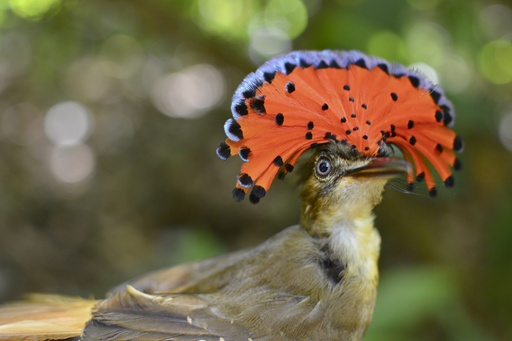Farms with natural landscape features provide sanctuary for some Costa Rica rainforest birds

This photo provided by researchers shows a royal flycatcher bird in Las Cruces Biological Station in Coto Brus, Costa Rica in March 2018. Small farms with natural landscape features such as shade trees, hedgerows and tracts of intact forest provide a refuge for some tropical bird populations, according to an 18-year study in Costa Rica, published on Monday, Sept. 4, 2023, in the journal Proceedings of the National Academy of Sciences. (J. Nicholas Hendershot via AP)
Small farms with natural landscape features such as shade trees, hedgerows and tracts of intact forest provide a refuge for some tropical bird populations, according to an 18-year study in Costa Rica.
For almost two decades, ornithologist James Zook has been collecting detailed records on nearly 430 tropical bird species found on small farms, plantations and undisturbed forests in the country.
While birds thrive the most in undisturbed rainforests, Zook said some species usually found in forests can establish populations in “diversified farms” that partially mimic a natural forest environment.
“How you farm matters,” said Nicholas Hendershot, a Stanford University ecologist and co-author of the study published Monday in the journal Proceedings of the National Academy of Sciences.
“In these diversified farms, you see growth over the long term in bird species with specialized needs,” such as safe and shady nooks to build nests and a variety of food sources, Hendershot said.
That trend was “in stark contrast to what we saw in intensive agriculture,” or monocrop pineapple and banana plantations, he said.
The findings may seem intuitive, but Natalia Ocampo-Penuela, a University of California, Santa Cruz conservation ecologist not involved in the study, said it’s extremely rare to have detailed long-term data from tropical regions to show that varied farming landscapes can sustain some forest bird populations.
“With 18 years of data, you can show the species is persisting in that area, not simply passing by,” she said.
Three-quarters of the 305 species found in diversified farms showed stable or growing populations over the time of study. These include the collared aracari, a small toucan-like bird, with a yellow chest and enormous beak, as well as several members of the manakin family — small brightly colored forest birds known for elaborate courtship dances.
“It’s a huge contribution to have documented that some birds aren’t just going there, but staying there and populations are growing,” said Ruth Bennett, an ecologist at the Smithsonian Migratory Bird Center, who was not involved in the research.
Still, such habitat sanctuaries don’t offset overall population losses from the conversion of primary forests to plantations, the authors stressed. “A pineapple plantation is like a ‘bird desert’ here,” said Zook.
Increasingly, scientists say conserving species will require paying attention to landscapes with a human footprint — not just untouched areas.
“Modern conservation has to happen not only inside the fences of protected areas, but within agricultural areas and even urban areas, where there’s potential habitat for at least some species,” said the University of California’s Ocampo-Penuela.